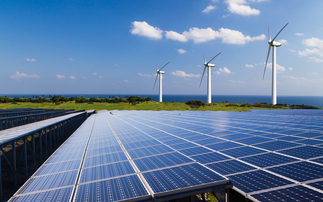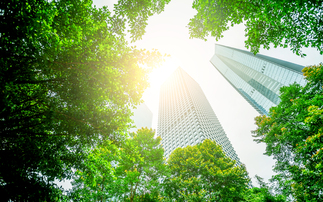The head of climate and energy at Ingka Group, which owns the majority of Ikea stores, sits down with BusinessGreen to discuss the company's sustainability plans and why investment now will secure the company's future profitability
A large part of Karol Gobczynski's working day is spent futuregazing. As head of energy and climate at Ingka Group, the Swedish company that owns most of Ikea's retail stores, his job involves poring over future energy scenarios and risk registers to strategise how the flatpack furniture giant can remain profitable and relevant as the global economy decarbonises.
With the energy and regulatory mix set to dramatically transform over the coming decade as fossil fuels fall out of favour and carbon taxes and other types of environmental regulation abound, it is no small task - especially once escalating climate impacts and increasing demand for sustainable goods is also factored in.
But, as Gobczynski emphasises in an interview with BusinessGreen, the net zero transition presents businesses with an opportunity as well as a challenge. Maintaining long-term resilience and prosperity throughout the forthcoming green industrial revolution should not be seen as a series of hurdles to clear, but as an opportunity for forward-thinking firms to flex and prove their business acumen, he says.
"At the end of the day, business exists to address challenges," he argues. "And if you are good at addressing challenges, you are becoming relevant to your consumer as well. In the past, maybe we were focused on overcoming financial challenges, but the same part of competitiveness and being relevant for the consumer is overcoming the challenges from the [environmental] footprint perspective."
Besides, modelling done by Gobczynski's team suggests government and corporate inaction on climate will exert a major toll on Ikea, he says. "We've done the analysis for the [International Energy Agency's] 4C scenario and also the 'well below 2C' scenario," he explains. "Within the 4C scenario, the risks are too big, and there are limited opportunities to mitigate them the risks. But with the 2C scenario, we see that with the right investment, we can mitigate the risks for the business for example from the cost perspective. There are more actually opportunities than risks within this scenario."
As such, Ikea does not intend to be a passive observer in the global economy's charge towards net zero emissions. After years of meticulously collecting data on the carbon footprint of its operations, products, customer travel, and supply chain partners, the firm is now working to reduce those numbers in line with the Paris Agreement's more ambitious 1.5C warming scenario. The company has pledged become a 'climate positive' business - in other words, reduce more greenhouse gas emissions than its entire value chain creates - by 2030, while at the same time overhauling its approach to manufacturing and design in order to become a 'circular business' in the same time frame. Delivering on the ambitious goal will involve making all products from renewable and recycled materials, generating all store energy and heating from renewable sources, and transitioning its entire delivery fleet off fossil fuels by the end of the decade - a target especially important in light of the company's surging e-commerce business.
The sustainability mission is a huge undertaking for the retail giant, which owns nearly 400 stores in 30 countries and boasts supply chains that extend across the world, but Gobczynski argues its future prosperity depends on bold action taken in the short-term. "It's good to consider climate as an integral part of your business, not on the side, because otherwise you'll always think about it as additional costs," he says. "We know the cost structure will change in the future, and so monitoring your emissions and addressing your emissions is just a way of securing lower costs in a future where carbon taxes are increasing, for example."
He adds that meaningful corporate climate action is increasingly a non-negotiable priority to attract customers and workers. "If you want to have the most talented people within your organisation, you need to enable people to make climate action as a part of everyday work," he muses.
While the last five years have been focused on setting out science-based climate targets and firming up the frameworks and parameters for the corporate environmental footprint data, Gobczynski explains Ikea is now focused on delivering the major transformations needed to meet those goals, often in close collaboration with its supply chain and retail sector peers. "We will see trends accelerating when it comes to renewable energy, electrification of vehicles and so on," he predicts. "Its important as a business to be prepared to transition quickly and build up based on these opportunities and changes, and of course new regulations." Ikea's climate risk disclosures to the Taskforce for Climate-related Financial Disclosures (TCFD) have played a major role in helping Ingka identify where the company needs to innovate, invest, and restructure its governance, he adds.
Ingka announced this autumn it would invest €600m in sustainability projects over the next year, split between renewable energy, innovative start-up projects, and measures that make its stores and warehouses more sustainable. Meanwhile, Ikea is in the middle of one of the biggest transformations in its history, motivated in large part by its sustainability goals. The company is planning to open 50 mid- to small-sized stores in the current financial year in city centres in a major departure from its trademark megastores that are typically found in out-of-town retail parks. It is hoped the shift will help the company slash the carbon footprint of customers travelling to and from its stores.
Moreover, Ikea's climate commitments have already significantly transformed the products stocked on its shelves and website, with customers now able to purchase high-efficiency LED lighting products, home solar services, and second-hand items returned by previous owners through a 'buy back scheme' launched this autumn.
Meanwhile, the firm's governance structures have also been updated in line with its climate goals. Ikea's country managers are now directly responsible for the environmental performance of their retail markets, after formally taking on the role of chief sustainability officer in July of last year. Each region's carbon emissions, water and energy use, and generated waste is tallied on a monthly basis, Gobczynski explains, and work is now underway to decide how environmental and climate metrics can be formally embedded into individual and country team goals.
"When it comes to integrating climate as a part of the business, one part is about assigning responsibilities and the other about updating the performance framework," he reflects. "It is really interesting journey that we are still on, exploring how we can further integrate [environmental] footprint into the performance framework."
Gobczynski argues even the most complex and onerous business decarbonisation challenges can be tackled with the right attitude and a readiness to collaborate with peers and suppliers, pointing to Ikea's membership of a number of high-profile business groups and climate initiatives. These range from corporate climate alliances, such as We Mean Business and the Climate Group's renewable and electric vehicle initiatives, to its part in an ongoing push from the British Retail Consortium to design an overarching net zero plan for UK's retail sector, and its work as a founding member of the SME Climate Hub, which provides smaller businesses that supply multinationals with decarbonisation resources and tools.
For instance, Ingka is actively collaborating with government and businesses in Russia and China on how the countries can increase the supply of clean electricity. While extensive investments in on-site solar projects and wind and solar energy means Ingka Group now generates more renewable energy than it consumes, the company's retail operations in the two countries continue to be powered by fossil fuel electricity. "We don't yet see how to do it in a credible way [to transition to clean energy] but we need to look into it, so we will collaborate with other businesses and with the government to find a way how to create that opportunity," Gobczynski says.
Looking ahead, Gobczynski is confident that despite Covid-19's impact on the global economy and Ikea's revenues, the lessons learned during the pandemic will ultimately accelerate the company's journey towards becoming a climate-responsible business. "What we learned this year is that you need to be prepared and consider risks, because when they come, they have a very big impact on the business," he reflects. "Climate change is not disappearing, and it will have an impact on the business. We need to invest to be relevant."
This article is part of We Mean Business' partnership with the Net Zero Festival 2020.









